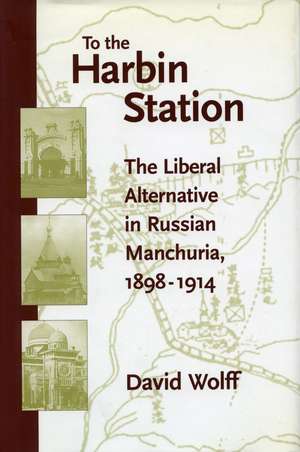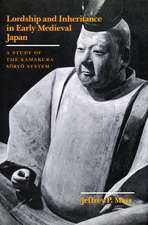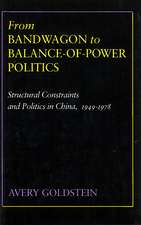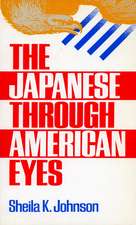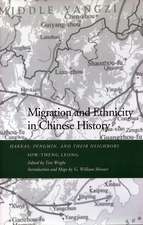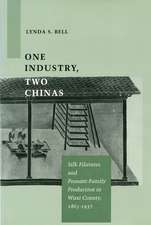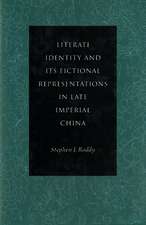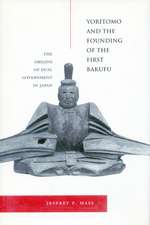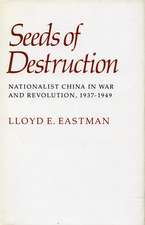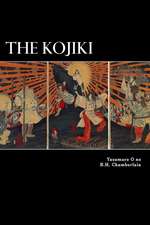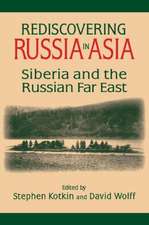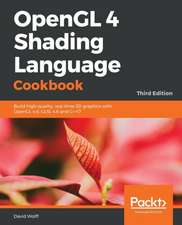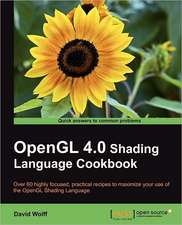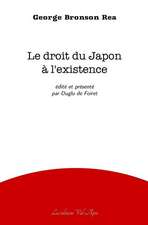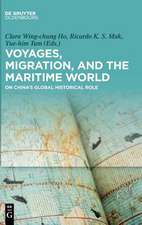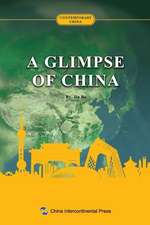To the Harbin Station: The Liberal Alternative in Russian Manchuria, 1898-1914
Autor David Wolffen Limba Engleză Hardback – 30 apr 1999
In 1898, near the projected intersection of the Chinese Eastern Railroad (the last leg of the Trans-Siberian) and China’s Sungari River, Russian engineers founded the city of Harbin. Between the survey of the site and the profound dislocations of the 1917 revolution, Harbin grew into a bustling multiethnic urban center with over 100,000 inhabitants. In this area of great natural wealth, Russian, Chinese, Japanese, Korean, and American ambitions competed and converged, and sometimes precipitated vicious hostilities.
Drawing on the archives, both central and local, of seven countries, this history of Harbin presents multiple perspectives on Imperial Russia’s only colony. The Russian authorities at Harbin and their superiors in St. Petersburg intentionally created an urban environment that was tolerant not only toward their Chinese host, but also toward different kinds of “Russians.” For example, in no other city of the Russian Empire were Jews and Poles, who were numerous in Harbin, encouraged to participate in municipal government. The book reveals how this liberal Russian policy changed the face and fate of Harbin.
As the history of Harbin unfolds, the narrative covers a wide range of historiographic concerns from several national histories. These include: the role of the Russian finance minister Witte, the building of the Trans-Siberian Railroad, the origins of Stolypin’s reforms, the development of Siberia and the Russian Far East, the 1905 Revolution, the use of ethnicity as a tool of empire, civil-military conflict, strategic area studies, Chinese nationalism, the Japanese decision for war against the Russians, Korean nationalism in exile, and the rise of the soybean as an international commodity. In all these concerns, Harbin was a vibrant source of creative, unorthodox policy and turbulent economic and political claims.
Drawing on the archives, both central and local, of seven countries, this history of Harbin presents multiple perspectives on Imperial Russia’s only colony. The Russian authorities at Harbin and their superiors in St. Petersburg intentionally created an urban environment that was tolerant not only toward their Chinese host, but also toward different kinds of “Russians.” For example, in no other city of the Russian Empire were Jews and Poles, who were numerous in Harbin, encouraged to participate in municipal government. The book reveals how this liberal Russian policy changed the face and fate of Harbin.
As the history of Harbin unfolds, the narrative covers a wide range of historiographic concerns from several national histories. These include: the role of the Russian finance minister Witte, the building of the Trans-Siberian Railroad, the origins of Stolypin’s reforms, the development of Siberia and the Russian Far East, the 1905 Revolution, the use of ethnicity as a tool of empire, civil-military conflict, strategic area studies, Chinese nationalism, the Japanese decision for war against the Russians, Korean nationalism in exile, and the rise of the soybean as an international commodity. In all these concerns, Harbin was a vibrant source of creative, unorthodox policy and turbulent economic and political claims.
Preț: 450.39 lei
Preț vechi: 556.03 lei
-19% Nou
Puncte Express: 676
Preț estimativ în valută:
86.18€ • 89.99$ • 71.17£
86.18€ • 89.99$ • 71.17£
Carte tipărită la comandă
Livrare economică 15-29 aprilie
Preluare comenzi: 021 569.72.76
Specificații
ISBN-13: 9780804732666
ISBN-10: 0804732663
Pagini: 276
Dimensiuni: 152 x 229 x 23 mm
Greutate: 0.59 kg
Ediția:1
Editura: Stanford University Press
Colecția Stanford University Press
ISBN-10: 0804732663
Pagini: 276
Dimensiuni: 152 x 229 x 23 mm
Greutate: 0.59 kg
Ediția:1
Editura: Stanford University Press
Colecția Stanford University Press
Recenzii
“This outstanding work, the first scholarly history of the formative years of the city of Harbin, is much more than urban or regional history. It responds to a need to understand...a unique experience, where local, national, and world cultures, economies, and politics intersected.”—Thomas Lahusen, Duke University
Notă biografică
David Wolff is the co-editor, with Stephen Kotkin, of Rediscovering Russia in Asia and editor of the Cold War International History Project Bulletin.
Textul de pe ultima copertă
“This outstanding work, the first scholarly history of the formative years of the city of Harbin, is much more than urban or regional history. It responds to a need to understand...a unique experience, where local, national, and world cultures, economies, and politics intersected.”—Thomas Lahusen, Duke University
